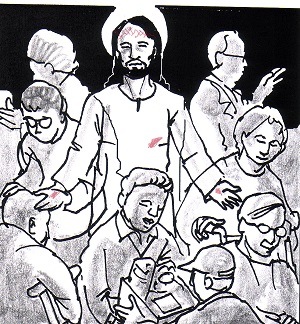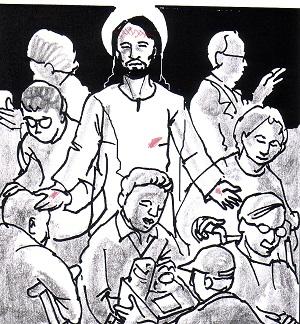

“I resolved to know nothing while I was with you except Jesus Christ, and him crucified” (I Cor 2:2).
1 Cor 2:1-5; Luke 4:16-30
Before St. Paul came to the city of Corinth, he had just experienced one of the most humiliating moments of his ministry. While visiting Athens, he had tried to convert some philosophers with a speech at the “Altar to an Unknown God” on the hill of the Areopagus (Acts 17:16-34). But when he proclaimed that Jesus, a crucified Jew, had been raised from the dead, they laughed at him.
In today’s first reading, we see the lesson Paul had learned in Athens about the limits of reason and philosophy in presenting the mystery of the cross, “a stumbling block to the Jews and foolishness to the Gentiles.” Human wisdom cannot grasp the paradox of such suffering as the most powerful form of love. From now on, Paul would only preach Christ crucified.
In today’s Gospel from Luke, Jesus goes home to Nazareth to preach in the synagogue. He chooses a passage from the Prophet Isaiah that begins, “The Spirit of the Lord is upon me and has anointed me to bring good news to the poor.” Isaiah 61 was a messianic promise to Israel returning from exile, so it must have been electrifying to the assembly when Jesus said these words were about him.
Jesus’ eloquence first impressed them, but then stirred resentment at the pretensions of this young village carpenter that God had chosen him to fulfill the Scriptures. They hustled him out of town and even tried to hurl him over a cliff. It was an inauspicious beginning to Jesus’ public ministry. Yet, Jesus already knew that no prophet was acceptable in his own native place. It would not be long before he was warning his disciples that his messianic call would end in crucifixion and death.
This week, we are invited to reflect on God’s mysterious power in history and the demands of our own discipleship. Jesus’ mission to bring reconciliation placed him at the crossroads of love and hate, peace and violence. The nonviolent messiah, God’s Suffering Servant, stepped into the breach to absorb the fury of sin and death in order to redeem the world. Many other prophets have also died as martyrs, yet this was the pattern Jesus knew and accepted -- that it was “necessary for the Son of Man to suffer in order to fulfill the Law and the Prophets.”
The word of God comes to us. How are we to respond? When fundamental and long overdue social change seems both necessary and possible through dialogue and the reform of our laws and political institutions, violent confrontation threatens to tear society apart. Where prophets have exposed wounds, voices of reconciliation are needed to heal them. Where fear is rising, peacemakers are needed to calm hearts. But this is risky work requiring patience, courage and ultimately self-sacrifice. In every age and in every crisis, God asks, “Whom shall I send?” Disciples of the crucified and risen Christ answer, “Send me.”
Advertisement







